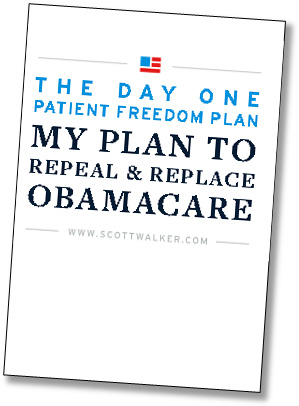Ramesh Ponnuru thinks I got Scott Walker’s health care plan wrong. Maybe! Let’s go through his objections.
- I complained that Walker’s plan would cost a lot but he doesn’t tell us how he’s going to pay for it without raising taxes. Ponnuru: “Walker says he is going to reform the tax break for employer-provided plans and get savings out of Medicaid….There’s no reason to doubt that some such mix could be made to work.”
I tentatively doubt it.1 My back-of-the-envelope guess was that after accounting for both Medicaid cuts and the end of Obamacare outlays, Walker still had a $100 billion hole. I was wrong about that. It’s probably more like $150 billion or so, since Walker would also repeal all of Obamacare’s taxes. The only proposal he offers to raise money for this is to “reform the way the tax
 code treats gold-plated, employer-sponsored health care plans.” This is the Obamacare Cadillac tax, and even in the far future it won’t generate anything close to $150 billion annually. Walker still has a very big hole to fill.
code treats gold-plated, employer-sponsored health care plans.” This is the Obamacare Cadillac tax, and even in the far future it won’t generate anything close to $150 billion annually. Walker still has a very big hole to fill.
- I complained that if you don’t have continuous coverage and you get sick or have a pre-existing condition, you’re screwed. Ponnuru: “At that point you’d have to go to a high-risk pool.”
There’s a reason I didn’t mention this. Walker says that his plan will “provide funds” and “flexibility” for states to address pre-existing conditions if they feel like it. “One way states could do this is by managing high-risk pools, something states have done for decades. My plan would make it easier for states to expand these pools, or pursue alternative approaches.”
In other words, high-risk pools aren’t a part of Walker’s plan. He just mentions them as a possibility that states might pursue if they want to. And anyway, high-risk pools are infamous for working poorly because they’re always underfunded. Would Walker really be willing to fund them at levels high enough to actually work?
- I complained that Walker doesn’t tell us how he’ll prevent insurance companies from raising rates on people with expensive pre-existing conditions. Ponnuru: “A protection for people in the group market who have maintained continuous coverage has been law since 1996. Walker’s plan would just expand and strengthen that approach in the individual market.”
That’s possible, but Walker’s plan doesn’t say this. I can only respond to things Walker actually says. What’s more, the individual market is fundamentally different from the group market, which is why HIPAA regulates the group market but doesn’t even try to regulate the individual market. This is tricky stuff, and requires more than “just” expanding and strengthening HIPAA. And since it likely requires a fair amount of detailed regulation—which Republicans are famously averse to— I’d like to hear how Walker plans to do it.
- I complained that Walker’s plan wouldn’t cover everyone. Ponnuru acknowledges this. I also complained that Walker had no concrete proposals to reduce the cost of health care. Ponnuru: “Capping the tax exclusion for employer-provided coverage is as much a ‘concrete proposal to reduce the cost of health care’ as anything in Obamacare. And so on.”
That’s true, and I should have acknowledged it. The Cadillac tax, which is part of both Obamacare and Walkercare, is likely to rein in costs. As for “And so on,” I’m not sure what to say. I need something more specific.
Nickel summary: Ponnuru is right about the Cadillac tax pushing costs down. But I don’t think his other criticisms really hold water.
On a related note, Ponnuru is right that, in practice, Obamacare doesn’t cover everyone. There will always be people who go uninsured regardless of mandates, either because they don’t feel like paying for insurance or because they can’t afford to, even with subsidies. But aside from illegal immigrants, Obamacare really does try to give everyone a chance to buy decent coverage. And it would cover many more people if Republican governors accepted Medicaid expansion and Republican members of Congress were willing to increase the funding for subsidies.
Walker’s plan, by contrast, doesn’t even try to cover everyone. There are lots of people who will fall through the cracks, and this is by design. Maybe you prefer this. I don’t. I’d like to see genuinely universal coverage. But either way, it’s a big difference.
1Tentatively because I don’t know for sure how much Walker’s plan will cost. Someone is bound to do a detailed dive into this eventually, and maybe it will turn out to be cheaper than I think. If so, I’ll let you know.













